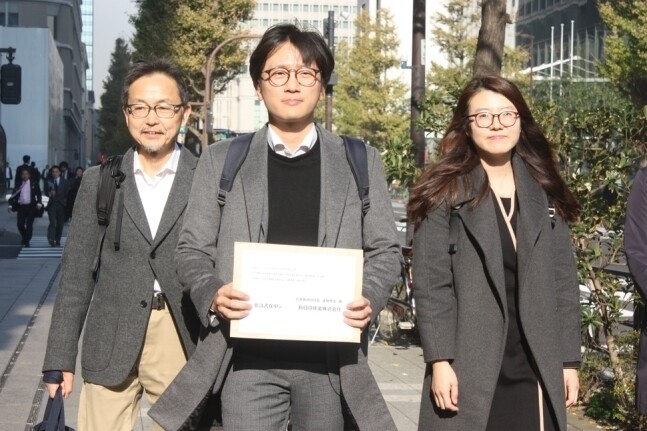hankyoreh
Links to other country sites 다른 나라 사이트 링크
Liquidation of Japanese assets seized in S. Korea may continue to next year

The process for liquidating South Korea-based assets seized from Japanese companies implicated in forced labor conscription and war crimes appears likely to spill over into next year. The delay comes after a court decision to go through questioning procedures in connection with the liquidation order request from attorneys representing the forced labor victims.
The Pohang branch of Daegu District Court announced on July 1 that it had decided on June 18 to submit questions to Nippon Steel and Sumitomo Metal, a Japanese company implicated in war crimes, notifying it that “any opinions [regarding the disposal order request] should be submitted in writing within 60 days.” Kim Se-eun and Im Jae-seong, attorneys from the law firm Haemaru who are representing forced labor victims, said the question document had been translated into Japanese and was awaiting delivery to Nippon Steel.
“If we factor in the time needed for the document’s delivery to Nippon Steel and the [60-day] period during which opinions can be submitted by Nippon Steel once it has received the document, it appears that it will take upwards of seven to eight months from the liquidation order request date for a decision to be made on the order,” the legal representatives said.
On May 1, the survivors’ legal team submitted a request for a court disposal order on 194,794 shares of the company PNR as South Korean assets belonging to Nippon Steel (valued at around 973 million won, or US$834,995, based on the face value of 5,000 won, or US$4.29). Conversion of the shares into cash was predicted to take around three months without questioning procedures. According to the Civil Execution Act, courts must question debtors prior to permitting a disposal order request. But the questioning requirement does not apply when the debtor is located overseas or is of unclear location. The Ulsan District Court did not proceed with questioning procedures in another liquidation order request case involving Fujikoshi, another Japanese company implicated in war crimes.
By Ko Han-sol, staff reporter
Please direct comments or questions to [english@hani.co.kr]

Editorial・opinion
![[Column] Season 2 of special prosecutor probe may be coming to Korea soon [Column] Season 2 of special prosecutor probe may be coming to Korea soon](https://flexible.img.hani.co.kr/flexible/normal/500/300/imgdb/original/2024/0426/3317141030699447.jpg) [Column] Season 2 of special prosecutor probe may be coming to Korea soon
[Column] Season 2 of special prosecutor probe may be coming to Korea soon![[Column] Park Geun-hye déjà vu in Yoon Suk-yeol [Column] Park Geun-hye déjà vu in Yoon Suk-yeol](https://flexible.img.hani.co.kr/flexible/normal/500/300/imgdb/original/2024/0424/651713945113788.jpg) [Column] Park Geun-hye déjà vu in Yoon Suk-yeol
[Column] Park Geun-hye déjà vu in Yoon Suk-yeol- [Editorial] New weight of N. Korea’s nuclear threats makes dialogue all the more urgent
- [Guest essay] The real reason Korea’s new right wants to dub Rhee a founding father
- [Column] ‘Choson’: Is it time we start referring to N. Korea in its own terms?
- [Editorial] Japan’s rewriting of history with Korea has gone too far
- [Column] The president’s questionable capacity for dialogue
- [Column] Are chaebol firms just pizza pies for families to divvy up as they please?
- [Column] Has Korea, too, crossed the Rubicon on China?
- [Correspondent’s column] In Japan’s alliance with US, echoes of its past alliances with UK
Most viewed articles
- 1[Column] Season 2 of special prosecutor probe may be coming to Korea soon
- 2‘We must say no’: Seoul defense chief on Korean, USFK involvement in hypothetical Taiwan crisis
- 3Is N. Korea threatening to test nukes in response to possible new US-led sanctions body?
- 4No good, very bad game for Korea puts it out of Olympics for first time since 1988
- 5Is Japan about to snatch control of Line messenger from Korea’s Naver?
- 6Division commander ordered troops to enter raging flood waters before Marine died, survivor says
- 7Korea’s 1.3% growth in Q1 signals ‘textbook’ return to growth, says government
- 8N. Korean delegation’s trip to Iran shows how Pyongyang is leveraging ties with Moscow
- 9[Editorial] Korea’s surprise Q1 growth requires objective assessment, not blind fanfare
- 10[Editorial] Government needs to stop impeding Sewol mourning